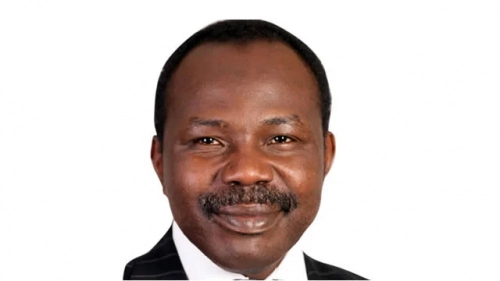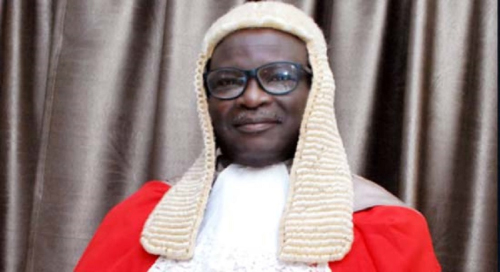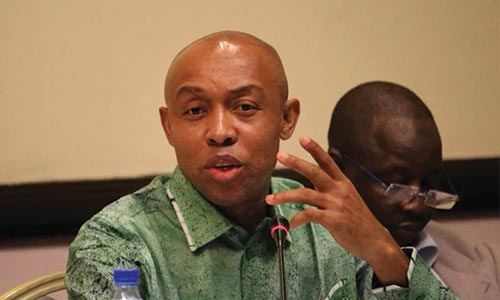Things Fall Apart

By Dr. Muiz-Banire SAN
“The centre can no more hold,” so says Chinua Achebe in his great work, “Things Fall Apart.” This seems to be the classical representation of the state of the Nigerian government. In Fela Anikulapo Kuti’s narrative in one of his rhythms, the scenario in the governance of the country is now Joro jara joro o, no break, no stop …! For any government to be effective, cohesion and teamwork are invaluable tools. This is a virtue currently missing in the governance of Nigeria.
In virtually all aspects of governance in the country, incoherence abounds.Is it at the ministerial level, agency or parastatal level, or even at thes tate governments’ level? It is all the same story. Government officials sing discordant tunes. This explains why, in spite of the evident multiplication of parastatals and agencies as contained in the Steve Orasanye report, nothing has been done for over a decade now to align and prune them. It is all story upon story, notwithstanding the fact as stated by the same Federal Government that the existence of these multiple agencies unnecessarily gulps over N300 billion annually.
This same government complains of over-burdening recurrent expenditure. In the military, evidence abounds of the same multiplicity. While the Nigerian Air Force is charged with the air defence of the country, the Nigerian Army is charged with the land defence. Notwithstanding this division of responsibilities, what you find is the Nigerian Air Force maintaining a sizeable number of land troops, including training schools, in competition with the army. Hence, the fund that should have been concentrated the air defense is now depleted on land defense that is not the air force’s mandate. Alternatively, it could have been spent on strengthening the Nigerian Army by way of capacity-building and equipment. Beyond the wastages and inefficiency, this act is birthing and has indeed birthed uncoordinated defense and undue rivalry in the military, particularly during the tenure of the last set of service chiefs. Take the Department of State Security (DSS), also. Till date, the department maintains a combat/strike team, which, primarily, is the work of the Nigeria Police.
The DSS is meant by its law to gather intelligence and pass it on to the relevant enforcement agency that is combatant. This is again not to be, as mistrust exists among them and roles continue to be duplicated. Recall also the struggle between the Police Service Commission and the Nigeria Police management over the recruitment issue that is being fought in court without any intervention from the Presidency till date? The National Security Adviser that was meant to be the coordinator was rendered impotent and subordinated to the then service chiefs. I have, in several of my interventions, raised this issue of uncoordinated governance but, rather than those concerned seeing the point as a feedback and averting its further occurrence, those in government took it as criticism and ignored the admonition.
As the Yoruba put it, Kaka ki o san ni ara iya aje, o fi gbogbo omo e b’obinrin, eye wa n yi lu eye, which literally means that “rather than for there to be improvement in the affairs of the old witch, she had all her offspring as female, witches then increase in number.” This anarchical state of affairs continues to fester, and as such it was not surprising to be treated again with another discordant tune between the Federal Ministry of Finance and the Central Bank of Nigeria (CBN) last week. There came the breaking news by the Central Bank Governor that a new series of naira denominations, the Nigerian currency, is to be in circulation from December 2022 and Nigerians are to deposit their old notes with the various banks for replacement between the time and latest 31st January, 2023.
According to the apex bank, the rationale behind this, apart from being a global best practice as authorized by the law, is to stem the tide of inflation that is already in two digits and track the activities of Nigerian saboteurs hoarding the naira at home. Immediately this information was publicized, a number of reactions came up in the public space condemning the decision, not proposal, on several grounds. The most cited narrative of the unpalatable likely consequence is the further depreciation of the currency, which is collapsing already, relying on the recent experience of India. While I am not going to join in that debate due to my lack of expertise in the subject, I am, however, able to debunk the reasoning on the ground of pragmatism. Firstly, Nigerians generally, apart from the marketmen and women who engage in small enterprises, do not store naira at home.
The only group of people or class of people in the habit of doing this storage are the politicians who use same in compromising the electoral process. This is indisputable as even daily donations are made in cash without anybody raising eyebrows. That those involved in the cash business are not only ascertainable but are known to the relevant authorities is a fact. In this class are the executive at all levels and the legislators. They are the sacred cows. Taming this nefarious act of the political class does not require the huge amount peddled for the redesigning and printing of new notes, but just the invocation of the statutory powers of the various anti-corruption agencies. The Economic and Financial Crimes Commission and the Independent Corrupt Practices Commission, among others, are still alive to do this job, if they are really serious and will not be chasing shadows.
All that is required is the political will of those concerned and no more. Secondly, Nigerians of other categories will rather store foreign currencies than naira, which is of great benefit to them in all ramifications. Apart from trading and making profit off foreign currencies in the nearest future, foreign currencies continue to appreciate and deliver more value to them than the naira. Now tell me how anyone will then choose to patronize a weak currency in the face of this reality! Thirdly, the catastrophic effect of the decision as announced was immediately felt in the marketplace as the naira dipped further. It is simple logic that immediately the announcement was made, even those with naira at home, particularly the politicians, opted for foreign currencies, which they can convert in the future to the new notes. The implication of this is the further pressure mounted on scarce foreign currencies. It is simple economics that the more the pressure on the dwindling foreign currency in the country, the higher the purchase price.
Now, it is also said that this will tame the activities of bandits and kidnappers. Honestly, I do not get this as it is again simple logic that not only will they be demanding new notes but will graduate into foreign currency mode. Do we need Sheikh Gumi to tell us this? From the above pedestrian view of mine, I believe that the decision is misplaced. This is not, however, my destination, as what actually triggers the crux of this engagement is the eventual bombshell thrown by the Minister of Finance, Zainab Ahmed, during a session with the Senate committee last week.
The minister had, in response to the development, said the ministry, which is responsible for the fiscal policy of the country, was not consulted on the decision by the apex bank. In fact, she categorically said that she heard the news item like any other Nigerian in the media. As a Nigerian, she, however, expressed her fears on the likely devastating consequences on the economy. I must confess that I was not shocked by the revelation as, over time, the minister, in my view, had abdicated her responsibility for the Central Bank governor, Godwin Emefiele. Virtually throughout her tenure so far, economic policies and programmes are usually dictated by the apex bank governor to the extent that Nigerians believe that the governor is the de facto minister of finance. Banning items and funding programmes of government ought to be announced by the minister, but more often than not it was and still is the apex bank governor that decides and reels out policies.
That the CBN runs a parallel government is no news as, in virtually all the intervention programmes, the apex bank sets up structures and manages them. That explains why a greater percentage of the interventions has failed so far. I recall the decision during the COVID-19 pandemic period to establish modern health facilities in all the zones of the country. The Central Bank hijacked the programme and, till date, the realization is in the pipeline. This is one among several others. In the Anchor Borrowers’ Scheme, the farmers are not liquidating the facilities, according to the same apex bank. The point I am struggling to make is that the CBN governor had always played the role of the minister for finance, including economic planning, and, as such, it is too late in the day for the minister to start crying foul when the head is off.
Even prior to the botched attempt of the Central Bank Governor to be a party presidential candidate, he had always competed with the politicians in the media space. I recall even during the Covid-19 pandemic, he was all over announcing and implementing policies for the Ministry of Health. Since then, some Nigerians had known that he was up to no good. It was no surprise therefore when ultimately, he manifested his true intention of political ambition. Now back to the scenario on ground, a sensitive policy option such as the redesigning and releasing of the country’s new notes ought to galvanize the opinions of all relevant stakeholders, particularly, the Ministry in charge of fiscal policy.
It is such a policy that will have multiplier effects on all Nigerians; and still the Central Bank Governor feels that his decision only requires the concurrence of Mr President and no one else. Honestly, I blame him not but the President. How dare such a memorandum receives presidential endorsement without the inputs of the President’s economic team led by the Vice President, the Ministry of Finance, and the legislators as representatives of the people.
The assertion by the Central Bank Governor that he has not breached any due process going by the dictates of the relevant provisions of its enabling law is absurd. Is he suggesting that all agencies, without consultation, can initiate and effect policies on the strength of their laws alone? Certainly, there appears to be a smear in the approval process itself. Did nobody in the presidency see the need to have input of the economic team and the Ministry responsible for fiscal and economic planning? Is this how things are approved? ‘This one tire me’ as Nigerians will say in the street lingo. If there is team work, all the inputs of the relevant stakeholders ought to be in the memorandum.
Further to the above is the act of insubordination. The Governor is not superior to the economic team and neither is he superior to the Minister of Finance who is a cabinet rank official. How come the President is allowing the man to jump these officials and ridiculing them, just as in the new note’s fiasco. I am unable to find the right phrase to capture this situation, even if we suspect that all relevant officials in the Presidency are compromised, can we impute same to the President?
Tani maa je ounje apa borokinni tan ti o pe ni haram (who will receive the largesse of a spendthrift and call it a forbidden fruit). Corroborating this suspicion is the statement credited to the President’s spokesman, Garba Sheu, that the President backs the Central Bank Governor. This, rather than being reconciliatory, promotes the disharmony in the government and further escalates the situation. Tani esinsin o ba gbe bi o se elegbo? Who will the housefly patronize if not the sore bearer? My last recollection is that the President’s in-law is still in charge of the printing corporation. Enu mi ko lo ti maa gbo pe iya teacher ku is the modern Yoruba proverbial innovation that I shall not be the announcer of bad news.
Is this not shameful? Further disappointing is the statement credited to the former Deputy Governor of the Bank, Kingsley Moghalu, who missed the point by a wide margin. Approval is not the issue but consultation. This much he needs to appreciate. What a disconnect! Can somebody help me? This is a reflection of how the country is governed and so no Nigerian should be surprised about the state of the nation. I am in complete alignment with Chinua Achebe that things have fallen apart and the center is no more holding. The good news however is that the tenure of the administration is fast running out and we expect the appropriate lessons to be noted by the in-coming administration. I believe it is too late to address the reigning confusion under the current administration. Nigerians should just improve their resilience.



